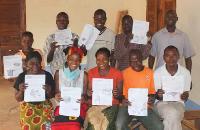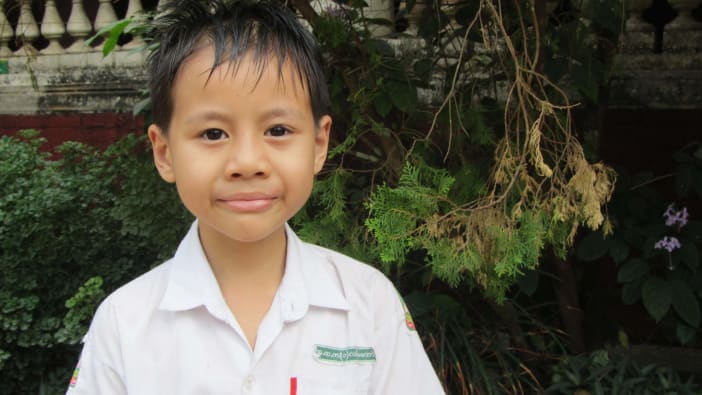The Diocese of Niassa in Mozambique works through ‘Equipas de Vida’ (which means ‘Life Teams’ in Portuguese) to share learning across communities. These teams are volunteer community groups of about 18 people. Teaching happens through a network of teachers and learners. First, a ‘supporter’ (or field worker) receives training on a certain topic. The supporter then goes from village to village, teaching the topic to the volunteers in the Life Teams who then divide into smaller groups and go from house to house, teaching everyone who is interested in learning.
There have been challenges in our work. At first, we used the word ‘campaign’ to describe our work but many people thought we were running a political campaign! Even when we stopped using the word ‘campaign’, some people were sceptical and didn’t want to talk with the teachers.
But there have also been benefits to our model. Those who are learning tend to be much more open to asking questions in the privacy of their own home than they would be in a large public forum. Also, it is a lot easier to pay attention when the person teaching you is sitting on your front veranda than it would be if the person teaching were in front of a large group.
One community which has benefited from our work is the village of Titimane, which is about 30 kilometres outside of the city of Cuamba. The Life Team learnt about HIV and was eager to start teaching others. They worked together with the government nurse in Titimane to make sure their information was correct. He was encouraging of their work and they were able to visit most of the houses in their community.
The chief and the church leader in Titimane said that they had never had any face to face teaching on HIV before. They had heard some information about HIV on the radio but commented, ‘you cannot ask questions to a radio’!
What has the impact been in Titimane? People now know that there is no risk of developing HIV simply by eating with people living with HIV. Some people have travelled to Cuamba to have HIV tests. The nurse is now doing advocacy himself on the issue, asking the district hospital in Cuamba to allow him to conduct the tests locally and for them to provide the materials he needs to do so. Those who have learnt, can now teach others!
Pass it on
Here is some advice if you are thinking of adopting the Life Team model in your area:
PRACTISE SAYING 'I DON'T KNOW'
Teaching people new things is exciting. Sometimes we have learnt so much that the people we are teaching think we know everything. At times, when we receive a difficult question and we don’t know the answer, we just guess! But this can have very bad consequences.
For example: Imagine you are doing great teaching about HIV, making really complicated topics seem really simple. Then someone asks you a question about medication. You are not sure what the right dose is, but you guess. But unfortunately, your guess is not correct. Because you have gained the trust of the person you are teaching, she believes you. Perhaps she passes what you have said on to her uncle and he changes how much medication he is taking and gets sick. Or perhaps she learns from the nurse that what you said about the dosage was incorrect and so starts to doubt everything you taught her, even though everything else was completely correct.
So, if you’re not completely sure about something, say ‘I don’t know!’ It is much better to admit you don’t know everything than to give someone false information. And if you think you know where you can find the information, respond, ‘I don’t know, but I’ll try to find out and get back to you!’
START WITH THE BASICS
Even when teaching advanced topics, make sure you do a good review of the basic topics first. We learn one step at a time. Building a house is a good analogy for building knowledge. If the foundation and the bricks at the bottom of the house are not firm, the new bricks on top will fall. It never hurts to do a clear review of basic topics before explaining the advanced ones. You can do so in a way that does not offend people’s intelligence – for example, before explaining the simple topic, you can say, ‘as you probably already know…’.
EXPLAIN WHY
Because people understand and remember new things much better when they understand WHY, do not just give information, explain why this is good advice.
For example: Instead of saying ‘you should use cow manure for making compost’ you can explain ‘cow manure is good for making compost because cows have lots of good bacteria in their four stomachs, and these bacteria help break down the other components in the compost’.
FOCUS ON WHAT IS MOST IMPORTANT
Do not overwhelm people with too much information in one session. Decide what is most important to communicate and focus on that before sharing more detailed knowledge. It is better for people to understand a few things well and remember them than to understand many things poorly and forget!
For example: When teaching about nutrition, make sure that people understand the importance of eating a variety of foods, including fruits and vegetables, before teaching something relatively detailed like the benefits of eating pumpkin seeds.
DON'T WASTE PEOPLE'S TIME
If they’re not interested, they will probably not listen very well. Teach what is relevant and what people are interested in.
IF POSSIBLE, PROVIDE A MEMORY AID
If finances allow, giving learners pamphlets with key points can be very useful. It can help them to remember and to study the most important topics. These pamphlets can be very simple, ideally including pictures and written in the local language.
Rebecca J Vander Meulen is Development Coordinator at the Anglican Diocese of Niassa








